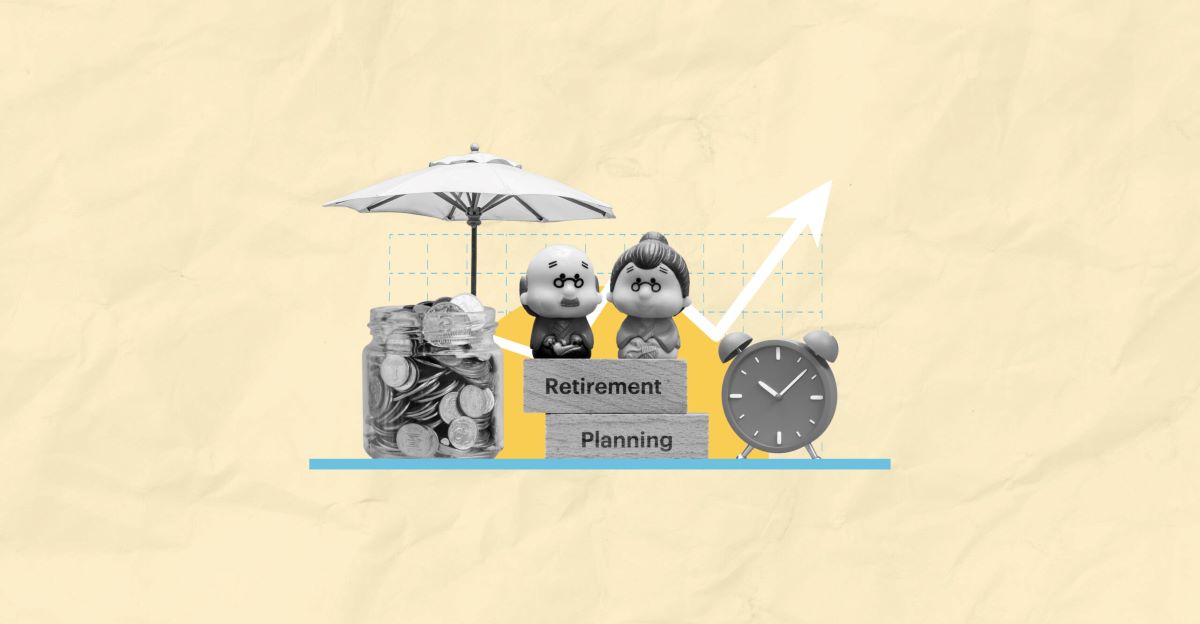

Finance
When To Start Retirement Planning
Published: January 21, 2024
Start planning your retirement today! Finance your future by understanding when and how to start retirement planning for a secure financial journey.
(Many of the links in this article redirect to a specific reviewed product. Your purchase of these products through affiliate links helps to generate commission for LiveWell, at no extra cost. Learn more)
Table of Contents
- Introduction
- Understanding the Importance of Retirement Planning
- Factors to Consider Before Starting Retirement Planning
- Determining the Right Time to Start Retirement Planning
- Steps to Take When Starting Retirement Planning
- Common Mistakes to Avoid in Retirement Planning
- Resources and Tools for Retirement Planning
- Conclusion
Introduction
Retirement planning is a crucial aspect of personal finance that often gets overlooked until it’s too late. Many people wrongly assume that retirement is a distant event that doesn’t require immediate attention. However, the truth is that the sooner you start planning for retirement, the better off you’ll be in the long run.
As the saying goes, “Time is money,” and this holds especially true when it comes to retirement planning. The earlier you start, the more time you have to save and invest, allowing your money to grow and compound over the years. This can make a significant difference in the amount of money you’ll have available for a comfortable retirement lifestyle.
Retirement planning is not just about saving money; it’s about envisioning and preparing for the future you desire. It involves setting financial goals, estimating expenses, and implementing strategies to ensure financial security during your golden years. By starting early and taking the necessary steps, you can make your retirement dreams a reality.
In this article, we will delve into the importance of retirement planning, the factors to consider before starting, determining the right time to begin, the steps to take when you embark on this journey, common mistakes to avoid, and resources and tools to assist you along the way.
So, if you’re ready to take control of your financial future and enjoy a stress-free retirement, let’s dive into the world of retirement planning and discover the secrets to a secure and fulfilling golden years.
Understanding the Importance of Retirement Planning
Retirement planning goes beyond setting aside a portion of your income each month; it is a comprehensive process that ensures a comfortable and financially secure retirement. Let’s delve into the reasons why retirement planning is essential:
- Longer Life Expectancy: People are living longer today, thanks to advancements in healthcare and increased awareness of a healthy lifestyle. While this is great news, it also means that you’ll likely spend more years in retirement. Adequate retirement planning ensures you have the resources to support yourself throughout your extended retirement years.
- Financial Independence: Retirement planning empowers you to achieve financial independence during your retirement years. By saving early and consistently, you can build a substantial nest egg that will support your desired lifestyle without relying solely on government pensions or assistance from family members.
- Inflation and Rising Costs: Inflation erodes the purchasing power of money over time. As the cost of living steadily increases, your retirement savings need to keep pace. By incorporating inflation into your retirement plan, you can ensure that your funds are sufficient to cover future expenses.
- Retirement Dreams and Goals: Retirement is a time to pursue your dreams and enjoy the activities you’ve always wanted to engage in. Whether it’s traveling, starting a small business, or spending quality time with loved ones, retirement planning allows you to set financial goals and allocate the necessary resources to fulfill them.
- Reduced Stress: Financial stress can take a toll on your mental and physical well-being. By planning for retirement early, you can alleviate stress and have peace of mind, knowing that you have a solid financial plan in place to support your future needs.
Understanding the importance of retirement planning is the first step towards securing your financial future. By recognizing the potential challenges and opportunities that lie ahead, you can make informed decisions and take the necessary actions to ensure a successful retirement.
Factors to Consider Before Starting Retirement Planning
Before embarking on your retirement planning journey, it’s important to consider several key factors that will significantly impact your financial preparations. By taking these factors into account, you can make informed decisions and customize your retirement plan to suit your unique circumstances. Here are some factors to consider:
- Current Age: Your current age plays a crucial role in determining your retirement planning strategy. The earlier you start planning, the more time you have to save and invest, allowing your money to grow over the long term. However, even if you’re starting later in life, it’s never too late to take steps towards securing your retirement.
- Retirement Goals: Clarifying your retirement goals will help you develop a realistic and actionable plan. Consider the lifestyle you envision during retirement, the activities and hobbies you want to pursue, and any major expenses you anticipate, such as travel or healthcare costs. Having a clear understanding of your goals will guide your savings and investment strategies.
- Healthcare Costs: As you age, healthcare becomes an increasingly important aspect of retirement planning. Consider the potential costs of medical care, insurance premiums, and long-term care needs. Research different healthcare options and factor them into your budget.
- Employment Benefits: Examine any retirement benefits offered by your employer, such as a 401(k) plan or pension. Understand the contribution options, matching programs, and vesting schedules. Take advantage of these benefits to maximize your retirement savings.
- Life Expectancy: While it’s impossible to predict your exact life expectancy, considering your family history and overall health can help estimate how long your retirement savings will need to sustain you.
- Debt and Expenses: Assess your current financial situation, including any outstanding debts and living expenses. Consider how these factors will evolve during retirement and create a plan to pay off debts and minimize expenses to ensure financial stability.
- Investment Strategy: Determine your risk tolerance and investment preferences. Consider diversifying your investment portfolio to maximize potential returns while minimizing risk. Consult with a financial advisor to create an investment strategy aligned with your retirement goals.
By considering these factors, you can lay a strong foundation for your retirement plan. Keep in mind that retirement planning is not a one-time process; it requires periodic review and adjustments to ensure it remains aligned with your changing circumstances and goals. Taking the time to carefully consider these factors will set you on a path towards a secure and fulfilling retirement.
Determining the Right Time to Start Retirement Planning
Deciding when to start retirement planning is a crucial step in securing your financial future. While there’s no definitive answer to exactly when you should begin, there are key indicators that can help guide your decision. Here are some factors to consider when determining the right time to start retirement planning:
- Age: The earlier you start planning for retirement, the better. Starting in your 20s or 30s allows you to take advantage of compounding interest and long-term investment growth, giving your savings more time to accumulate and grow. However, if you haven’t started planning early, don’t despair. It’s never too late to begin, regardless of your age.
- Financial Stability: Assessing your current financial situation is crucial before diving into retirement planning. If you have a stable income, minimal debt, and a healthy emergency fund, you may be in a good position to start setting aside money for retirement. On the other hand, if you’re struggling with debt or have limited resources, it may be necessary to focus on improving your financial situation before committing to retirement planning.
- Goals and Aspirations: Consider your retirement goals and aspirations. Do you have a clear vision of the lifestyle you want to lead in retirement? Understanding your goals will help you determine how much you need to save and plan accordingly.
- Employer Benefits: Take advantage of any retirement benefits offered by your employer. If your company provides a retirement savings plan, such as a 401(k), and offers a matching contribution, it’s wise to start contributing early to maximize your savings potential.
- Life Events: Major life events, such as getting married, having children, or receiving an inheritance, can impact your financial situation and influence your retirement planning choices. Evaluate these events and adjust your retirement plan accordingly.
- Market Conditions: While you can’t predict the stock market’s performance, being aware of the current economic climate can help inform your decisions. If the market is volatile or showing signs of recession, it may be advisable to focus on building an emergency fund before allocating significant funds to retirement savings.
Ultimately, the right time to start retirement planning is now. Every year you delay means less time for your savings to grow. Regardless of your age or financial situation, taking even small steps towards retirement planning can make a significant difference in the long run. Consult with a financial advisor to get personalized guidance based on your specific circumstances, and remember that it’s never too early or too late to start planning for a secure and fulfilling retirement.
Steps to Take When Starting Retirement Planning
When beginning your retirement planning journey, it’s important to take specific steps to ensure you’re on the right track. These steps will help you establish a solid foundation for your retirement plan and set you up for a secure financial future. Here are some key steps to take when starting retirement planning:
- Set Clear Goals: Define your retirement goals and aspirations. Consider the lifestyle you want to lead, the activities you want to engage in, and any major expenses you anticipate. Having clear goals will guide your planning efforts.
- Assess Your Current Financial Situation: Review your current income, expenses, and assets. Take an inventory of your debts and evaluate your overall financial health. This will help you understand where you stand and what adjustments may be necessary.
- Create a Budget: Develop a comprehensive budget that includes current expenses and projected retirement expenses. Consider factors such as healthcare costs, travel, and leisure activities. Analyzing your budget will help you determine how much you need to save to achieve your retirement goals.
- Estimate Your Retirement Income: Calculate your expected retirement income from sources such as Social Security, pensions, and any other retirement accounts you hold. This will give you an idea of how much you’ll have available to support your retirement lifestyle.
- Start Saving Early: Begin setting aside money for retirement as early as possible. Contribute to retirement accounts, like 401(k)s or IRAs, and take advantage of any employer matching contributions. The power of compounding interest can significantly boost your savings over time.
- Invest Wisely: Develop an investment strategy that aligns with your risk tolerance and retirement goals. Diversify your investments to spread risk and maximize returns. Consider consulting with a financial advisor to ensure your investment choices are suitable for your needs.
- Review and Adjust Regularly: Regularly review your retirement plan and make adjustments as needed. Life circumstances and financial markets evolve, so it’s important to stay informed and adapt your plan accordingly.
- Consider Professional Advice: Seek the guidance of a financial advisor who specializes in retirement planning. They can provide objective advice and help you develop a comprehensive plan tailored to your specific needs and goals.
Remember, retirement planning is an ongoing process that requires continuous attention and adjustments. Stay proactive and regularly assess your progress towards your retirement goals. With discipline and proper planning, you can build a solid financial foundation that will support you throughout your retirement years.
Common Mistakes to Avoid in Retirement Planning
Retirement planning is a complex process that requires careful consideration and attention to detail. There are several common mistakes that individuals often make during their retirement planning journey. By being aware of these pitfalls, you can avoid them and ensure a smoother path towards a secure retirement. Here are some common mistakes to avoid:
- Procrastination: One of the biggest mistakes is delaying retirement planning. The earlier you start, the more time you have to save and grow your nest egg. Waiting too long can significantly limit your options and force you to play catch-up in your later years.
- Underestimating Expenses: Failing to accurately estimate your future expenses can lead to financial strain in retirement. Consider factors such as healthcare costs, inflation, and potential changes in lifestyle. Be sure to account for all relevant expenses to avoid running out of funds.
- Overlooking Retirement Account Options: Many individuals neglect to maximize contributions to retirement accounts, such as 401(k)s and IRAs. Take advantage of these tax-advantaged accounts and contribute as much as possible to benefit from compounding growth.
- Ignoring Healthcare Costs: Healthcare expenses tend to increase with age, and not properly accounting for these costs can be detrimental. Consider long-term care insurance and include healthcare expenses in your retirement budget.
- Relying Solely on Social Security: Social Security benefits alone are often insufficient to support a comfortable retirement. While it’s an essential component of your retirement income, it should not be the sole source. Supplement Social Security with other savings and investments.
- Failing to Diversify Investments: Over-reliance on a single investment or asset class can lead to increased risk. Diversify your investment portfolio to spread risk and maximize potential returns. Consult with a financial advisor to develop an appropriate investment strategy.
- Not Revisiting and Adjusting the Plan: Circumstances change over time, so it’s crucial to regularly review and adjust your retirement plan. Life events, market conditions, and personal goals can all impact your plan’s effectiveness. Stay proactive and make necessary revisions as needed.
- Underestimating Longevity: People are living longer, so it’s essential to plan for a longer retirement period. Underestimating your life expectancy can result in running out of money in your later years. Consider the potential for a lengthy retirement and adjust your savings and investment strategies accordingly.
By avoiding these common mistakes, you can enhance the effectiveness of your retirement plan and increase the likelihood of achieving your financial goals. Seek guidance from professionals, educate yourself about retirement planning, and stay proactive in managing your finances to ensure a secure and comfortable retirement.
Resources and Tools for Retirement Planning
Retirement planning can be a complex process, but fortunately, there are various resources and tools available to help you navigate this important journey. Whether you prefer online resources, books, or professional guidance, these tools can provide valuable information and assistance to support your retirement planning efforts. Here are some key resources and tools to consider:
- Online Retirement Planning Calculators: Use online retirement calculators to estimate how much you need to save for retirement and determine if you’re on track. These tools take into account factors such as current savings, desired retirement age, expected expenses, and investment returns to provide personalized projections.
- Financial Planning Software: Consider using financial planning software that provides comprehensive retirement planning features. These tools can help you analyze different scenarios, track your expenses, manage investments, and create retirement income projections.
- Retirement Planning Websites and Blogs: Numerous websites and blogs provide valuable information and insights on retirement planning. Sites like the Social Security Administration, AARP, and Investopedia offer articles, calculators, and resources to help you make informed decisions.
- Books on Retirement Planning: There is a wealth of books written by experts in the field of retirement planning. Some popular titles include “The Bogleheads’ Guide to Retirement Planning” by Taylor Larimore, “How to Retire Happy, Wild, and Free” by Ernie J. Zelinski, and “The Number: What Do You Need for the Rest of Your Life and What Will It Cost?” by Lee Eisenberg.
- Professional Financial Advisors: If you prefer personalized guidance, working with a certified financial planner can be invaluable. These professionals can help you assess your financial situation, create a retirement plan, suggest investment strategies, and provide ongoing support to help you stay on track.
- Retirement Education and Workshops: Look for educational workshops and seminars on retirement planning offered by financial institutions, community centers, or retirement organizations. These events can provide valuable insights and allow you to network with other individuals on similar retirement planning journeys.
- Government Resources: Government websites, such as the Social Security Administration and the Department of Labor, offer comprehensive information on retirement benefits, rules, and regulations. These resources can help you navigate the complexities of government programs and make informed decisions regarding your retirement.
When utilizing these resources and tools, keep in mind that everyone’s retirement planning needs are unique. It’s important to tailor the information and strategies to your specific situation and goals. Remember to always double-check the credibility of the resources and seek professional advice if needed. By leveraging these tools and resources, you can enhance your understanding of retirement planning and make more informed decisions along the way.
Conclusion
Retirement planning is a vital aspect of personal finance that should not be overlooked or delayed. It’s never too early or too late to start creating a roadmap for your golden years. By taking the time to understand the importance of retirement planning and considering key factors such as age, goals, and financial stability, you can lay a solid foundation for a secure and fulfilling retirement.
Throughout the process, it’s essential to be mindful of common mistakes and avoid them. Procrastination, underestimating expenses, and neglecting to diversify investments are just a few of the pitfalls that can hinder your retirement planning efforts. By staying proactive, regularly reviewing and adjusting your plan, and seeking professional guidance when necessary, you can minimize risks and maximize your chances of achieving your desired retirement lifestyle.
Fortunately, there are resources and tools available to support you on your retirement planning journey. Online calculators, financial planning software, books, and professional financial advisors can offer valuable insights and guidance. Additionally, retirement planning websites, educational workshops, and government resources provide a wealth of information to help you make informed decisions.
Remember, retirement planning should be a personalized and ongoing process that considers your unique circumstances and goals. Regularly reassess your financial situation, update your retirement plan, and stay informed about changes in the financial landscape to ensure your plan remains on track. By taking these steps, you can enjoy a financially secure and satisfying retirement, free of unnecessary stress and financial worries.














